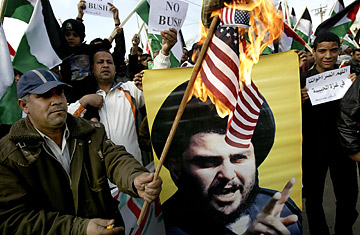
Supporters of Muqtada al-Sadr burn an American flag during a protest against the Israeli air strikes in Gaza
The once fearsome Muqtada al-Sadr has been very quiet lately in Iraq. Political analyst Amir Hassan Fayht says the reason the onetime Iraqi militant shows less and less political muscle is simple. "He gave it up," says Fayht, dean of the college of political science at Baghdad University, "just like that."
Indeed, al-Sadr's once formidable movement appears to be at its nadir, with the cleric himself scarcely a presence in Iraqi politics these days and his political bloc pushed to the sidelines of the provincial elections on Jan. 31. A series of military defeats at the hands of toughened Iraqi security forces plus political missteps over the past year by al-Sadr and his followers have left the future of the mass movement in doubt. And without a solid showing of popular support in the coming vote, the Sadrists appear set to lose what remains of the enormous political power they once held. (See pictures of life returning to Iraq's streets.)
Prospects for al-Sadr's militia, the Mahdi Army, and the political figures who stood at the edge of it have steadily dimmed since last spring, when government forces of Prime Minister Nouri al-Maliki emerged as the de facto victors in battles with the Mahdi Army across southern Iraq and Baghdad. Weeks of fighting in the early months of 2008 ended in a stalemate. Since then, Iraqi security forces have rounded up scores of Sadrists with the help of U.S. troops, effectively hollowing out the movement's street power and political influence. Meanwhile, the vast popularity that al-Sadr's movement once enjoyed among Iraq's Shi'ites seems to have declined too as Iraqis appear to grow increasingly weary of sectarian politics. A recent poll published by the National Media Center, which is funded by the Iraqi government, said 42% of Iraqis hoped to see secular candidates win in the coming provincial elections (31% said they wanted candidates from religious parties to take seats).
The veracity of the government poll is questionable, but the results appear to be in step with popular sentiment toward the Sadrists in Baghdad, where many have come to see the cleric's followers as thugs and opportunists. "I am not satisfied with the ideology of these people," says Rasim Hassan Haikel, a Shi'ite shopkeeper in the northern Baghdad neighborhood of Huriya, a longtime Mahdi Army stronghold.
The Sadrists seem to have taken a cue from their lack of popularity and decided not to field candidates officially in the provincial elections. Instead, the Sadrists are quietly backing some candidates who maintain an association with the movement. Rumored to be undergoing religious studies in Iran, al-Sadr has stayed out of view and said little about the elections. "Our main goal is to increase the numbers of independents and technocrats so they will be busy rebuilding the country, not their party's political agenda," says Sheik Salah al-Obeidi, al-Sadr's chief spokesman. "Our strategy is to fight against corruption and to rebuild."
Provincial balloting in southern Iraq on Jan. 31 will probably reveal how much life remains in the Sadrist movement. If candidates tied to the movement fail to make a decent showing in cities such as Basra, Amarah, Najaf and Karbala, the Sadrists' only official political power will be in the Iraqi parliament, where they hold 28 of 275 seats.
Sadrist parliamentarian Ahmad Hassan Ali al-Masiodi said the movement will retain its stature regardless of the elections. Al-Masiodi pointed to al-Sadr's previous ability to call up mass street protests with a word as a sign of the movement's clout and relevance. "The movement is very strong now, even better than before," says al-Masiodi. "You can notice this when we call for demonstrations in the number of people who come to join." But al-Sadr has not tested his strength with street marches lately. And that power, too, may go the way of his waning influence in national politics.
With reporting by Mazin Ezzat and Kudhir Abbas
